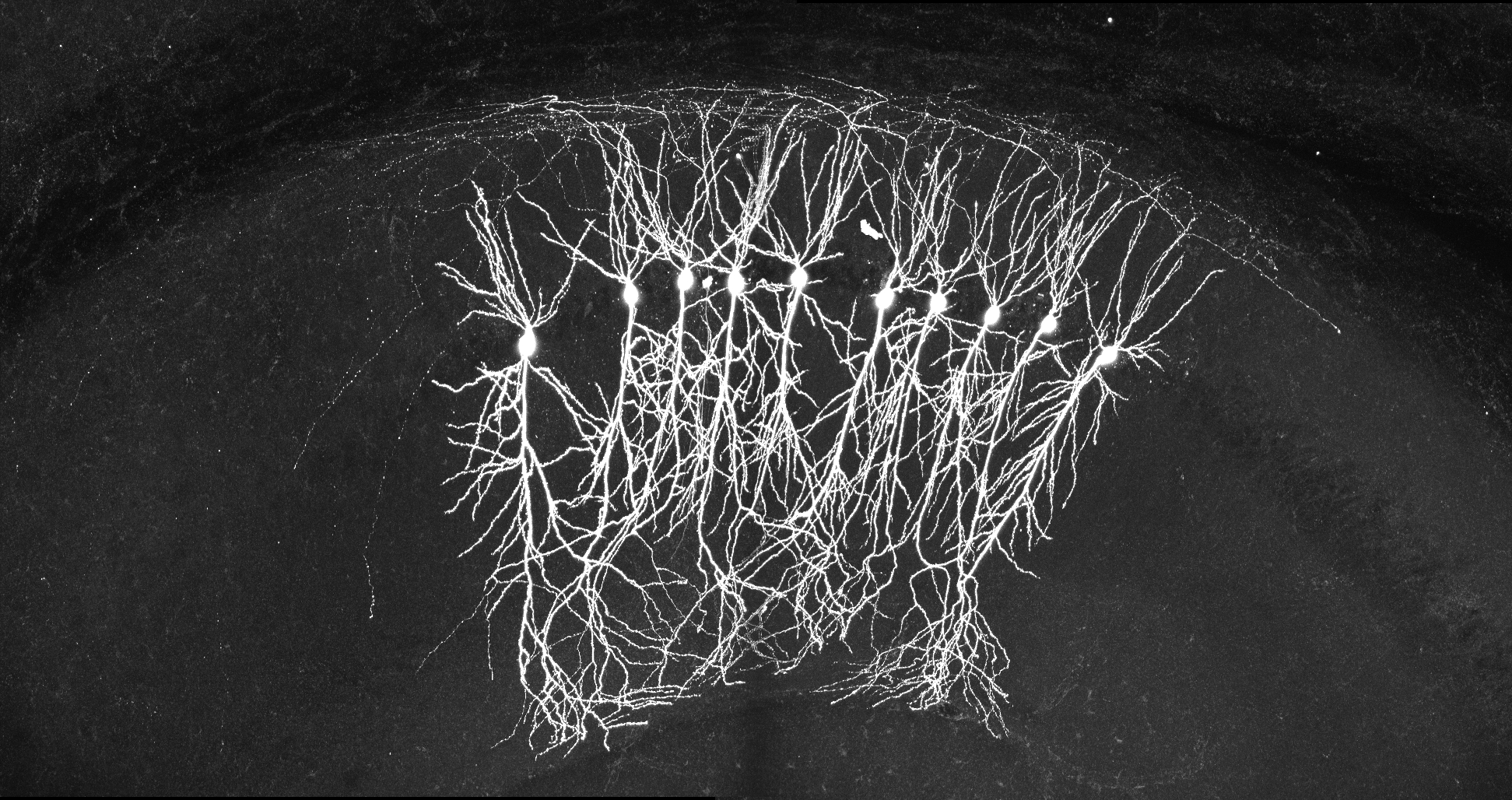Navigation auf uzh.ch
Navigation auf uzh.ch
Contrary to traditional assumptions circuit formation can occur the adult mammalian brain (Seng et al., 2022). However, the molecular mechanisms of axon growth and wiring in the adult are poorly understood. Recent work from the lab has identified two factors, the transcription factor Ascl4 and the transcriptomic regulator Id2, whose ectopic overexpression can reactivate axon growth and wiring in different types of healthy adult neurons (Luo et al., 2021 and 2024). This suggests that adult brain wiring is transcriptionally controlled and can be initiated cell autonomously. In other work, we have characterized the rewiring of hippocampal neurons and the rapid formation of a contralateral circuitry in the context of disease (Luo et al., 2022; Egger et al., 2023). To further this work, we are investigating additional molecules that can reactivate adult wiring, as well as the properties of the new circuits and their effects on brain function. Finally, we are investigating the mechanisms that maintain the remarkable integrity of neural circuits throughout life and their potential dysfunction in brain disease and aging.
Recent publications:
Luo W, Egger M, Cruz-Ochoa N, Tse A, Maloveczky G, Tamás B, Lukacsovich D, Seng C, Amrein I, Lukacsovich T, Wolfer D, Földy C (2024) Activation of feedforward wiring in adult hippocampal neurons by the basic-helix-loop-helix transcription factor Ascl4. PNAS Nexus. 3(5):pgae174Link
Egger M, Luo W, Cruz-Ochoa N, Lukacsovich D, Varga C, Que L, Maloveczky G, Winterer J, Kaur R, Lukacsovich T, Földy C (2023) Commissural dentate granule cell projections and their rapid formation in the adult brain. PNAS Nexus, 2(4):pgad088. Link
Luo W, Cruz-Ochoa NA, Seng C, Egger M, Lukacsovich D, Lukacsovich T, Földy C (2022) Pcdh11x controls target specification of mossy fiber sprouting. Frontiers in Neuroscience 16:888362. Link
Seng C, Luo W, Földy C (2022) Circuit formation in the adult brain. European Journal of Neuroscience, 56(3):4187-4213. (Review) Link
Luo W, Egger M, Domonkos A, Que L, Lukacsovich D, Cruz-Ochoa NA, Szőcs S, Seng C, Arszovszki A, Sipos E, Amrein I, Winterer J, Lukacsovich T, Szabadics J, Wolfer DP, Varga C, Földy C. (2021) Recurrent rewiring of the adult hippocampal mossy fiber system by a single transcriptional regulator, Id2. Proc Natl Acad Sci U S A. 118(40):e2108239118. Link
Different types of neurons produce different patterns of brain activity and behavior. Cell type classification schemes have given us detailed insights into how this might work at the circuit level. Transcriptomic approaches, such as single-cell RNAseq, patch RNAseq, and spatial transcriptomics, are expanding this framework, particularly with respect to the molecular characterization of the different neuronal types. We characterize the transcriptomic profile of neurons in different brain regions, developmental stages, circadian times, and behavioral states.
Recent publications:
Pierre-Ferrer S, Collins B, Lukacsovich D, Wen S, Cai Y, Winterer J, Yan J, Pedersen L, Földy C, Brown SA (2024) A phosphate transporter in VIPergic neurons of the suprachiasmatic nucleus gates locomotor activity during the light/dark transition in mice. Cell Reports. 43(5):114220.Link
Campbell BFN, Cruz-Ochoa N, Otomo K, Lukacsovich D, Espinosa P, Abegg A, Luo W, Bellone C, Földy C, Tyagarajan SK (2024) Gephyrin phosphorylation facilitates sexually dimorphic development and function of parvalbumin interneurons in the mouse hippocampus. Mol Psychiatry. doi: 10.1038/s41380-024-02517-5. Epub ahead of print.Link
Beerens S, Winterer J, Lukacsovich D, Földy C*, Wozny C* (2022) Transcriptomically-guided pharmacological experiments in neocortical and hippocampal NPY-positive GABAergic interneurons. eNeuro. 9(2):ENEURO.0005-22.2022. (*Corresponding author) Link
Boxer EE, Seng C, Lukacsovich D, Kim J, Schwartz S, Kennedy MJ, Földy C, Aoto J (2021) Neurexin-3 defines synapse- and sex-dependent diversity of GABAergic inhibition in ventral subiculum. Cell Reports, 37(10):110098. Link
Que L*, Lukacsovich D*, Luo, W, Földy C (2021) Transcriptional and morphological profiling of parvalbumin interneuron subpopulations in the mouse hippocampus. Nature Communications, 12(1):108. (*Equal contributions) Link
Sticco MJ, Peña Palomino PA, Lukacsovich D, Thompson BL, Földy C, Ressl S, Martinelli DC (2021) C1QL3 promotes cell-cell adhesion by mediating complex formation FASEB J, 35(1):e21194. Link
Collins B, Pierre-Ferrer S, Muheim C, Lukacsovich D, Cai Y, Spinnler A, Gutierrez Herrera C, Wen S, Winterer J, Belle MDC, Piggins HD, Hastings M, Loudon A, Yan J, Földy C, Adamantidis A, Brown SA (2020) Circadian VIPergic neurons of the suprachiasmatic nuclei sculpt the sleep-wake cycle. Neuron, 108(3):486-499. Link
Oláh VJ, Lukacsovich D, Winterer J, Arszovszki A, Lőrincz A, Nusser Z, Földy C, Szabadics J (2020) Functional specification of CCK+ interneurons by alternative isoforms of Kv4.3 auxiliary subunits. Elife, 9:e58515. Link
Steinberg EE, Gore F, Heifets BD, Taylor MD, Norville ZC, Beier KT, Földy C, Lerner TN, Luo L, Deisseroth K, Malenka RC (2020) Amygdala-midbrain connections modulate appetitive and aversive learning. Neuron, 106(6):1026-1043.e9. Link
Cerniauskas I, Winterer J, de Jong JW, Lukacsovich D, Yang H, Khan F, Peck JR, Obayashi SK, Lilascharoen V, Lim BK, Földy C*, Lammel S* (2019) Chronic stress induces activity, synaptic and transcriptional remodeling of the lateral habenula associated with deficits in motivated behaviors. Neuron, 104(5):899-915.e8. (*Corresponding author) Link
Winterer J*, Lukacsovich D*, Que L, Sartori AM, Luo W, Földy C (2019) Single-cell RNAseq characterization of anatomically-identified OLM interneurons in different transgenic mouse lines. European Journal of Neuroscience, 50(11):3750-3771. (*Equal contributions) Link
Lukacsovich D*, Winterer J*, Que L, Luo W, Lukacsovich T, Földy C (2019) Single-cell RNAseq reveals developmental origins and ontogenetic stability of neurexin alternative splicing profiles, Cell Reports, 27(13):3752–3759. (*Equal contributions) Link
Que L, Winterer J, Földy C (2019) Deep survey of GABAergic interneurons: Emerging insights from gene-isoform transcriptomics. Front Mol Neurosci, 12:115. Link
